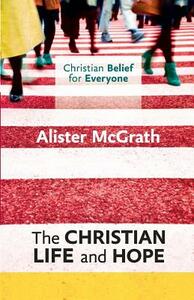Take a photo of a barcode or cover
marc129's review against another edition
2.0
This fifth and final part of McGrath's introduction to Christianity highlights some aspects he didn’t yet touch upon, most notably the sacraments and the belief in the afterlife. Again there are interesting initiations, but the author's main aim is encyclopedic rather than inspiring. His long explanation of the different views on the Eucharist is typical in that regard. McGrath does his best to show that Christianity is more than a doctrine, but the approach that emerges from this series remains very cerebral. Ethics, for example, is only worth a few paragraphs.
drbobcornwall's review against another edition
4.0
With "The Christian Life and Hope," theologian Alister McGrath brings to a conclusion his five volume "The Heart of Christian Faith" series. These relatively brief, readable books, provide a study guide for those wishing to explore their faith. McGrath is a British evangelical teaching at Oxford University. I used his [b:Christian Theology: An Introduction|23003|Christian Theology An Introduction|Alister E. McGrath|https://d.gr-assets.com/books/1388197580s/23003.jpg|1241058] when I taught theology two decades back, in large part because he approached theology from a historical perspective. In this series he offers a much briefer take on theology, offering the reader a big picture approach.
In this volume McGrath explores the sacraments, the resurrection, the idea of heaven as Christian hope, and the Christian life (ethics). The book is good straightforward moderately evangelical, orthodox Christian thought. As a Protestant he embraces two sacraments, and here takes us into some of the varieties of interpretation of them. With regard to the resurrection, he embraces a traditional vision, though here the focus is on the general resurrection rather than that of Jesus. With regard to heaven, rather than being an opiate, the vision of heaven gives hope for this life. It reminds us that our true destiny is union with God. Regarding the inbetween times, well it starts with worship.
What I like about McGrath is that he recognizes the importance of thinking through faith. That's why we have doctrines. They emerge out of our contemplation of the things of God. I may not have as strong an attachment to the creeds as does he, but Christian maturity comes as we dive into the meaning of our faith. I also appreciate the tone of his work. He's more conservative than I am, but I am comfortable with his presentation.
This is a good starting place for exploring faith, but it's not the end of the journey!
In this volume McGrath explores the sacraments, the resurrection, the idea of heaven as Christian hope, and the Christian life (ethics). The book is good straightforward moderately evangelical, orthodox Christian thought. As a Protestant he embraces two sacraments, and here takes us into some of the varieties of interpretation of them. With regard to the resurrection, he embraces a traditional vision, though here the focus is on the general resurrection rather than that of Jesus. With regard to heaven, rather than being an opiate, the vision of heaven gives hope for this life. It reminds us that our true destiny is union with God. Regarding the inbetween times, well it starts with worship.
What I like about McGrath is that he recognizes the importance of thinking through faith. That's why we have doctrines. They emerge out of our contemplation of the things of God. I may not have as strong an attachment to the creeds as does he, but Christian maturity comes as we dive into the meaning of our faith. I also appreciate the tone of his work. He's more conservative than I am, but I am comfortable with his presentation.
This is a good starting place for exploring faith, but it's not the end of the journey!
